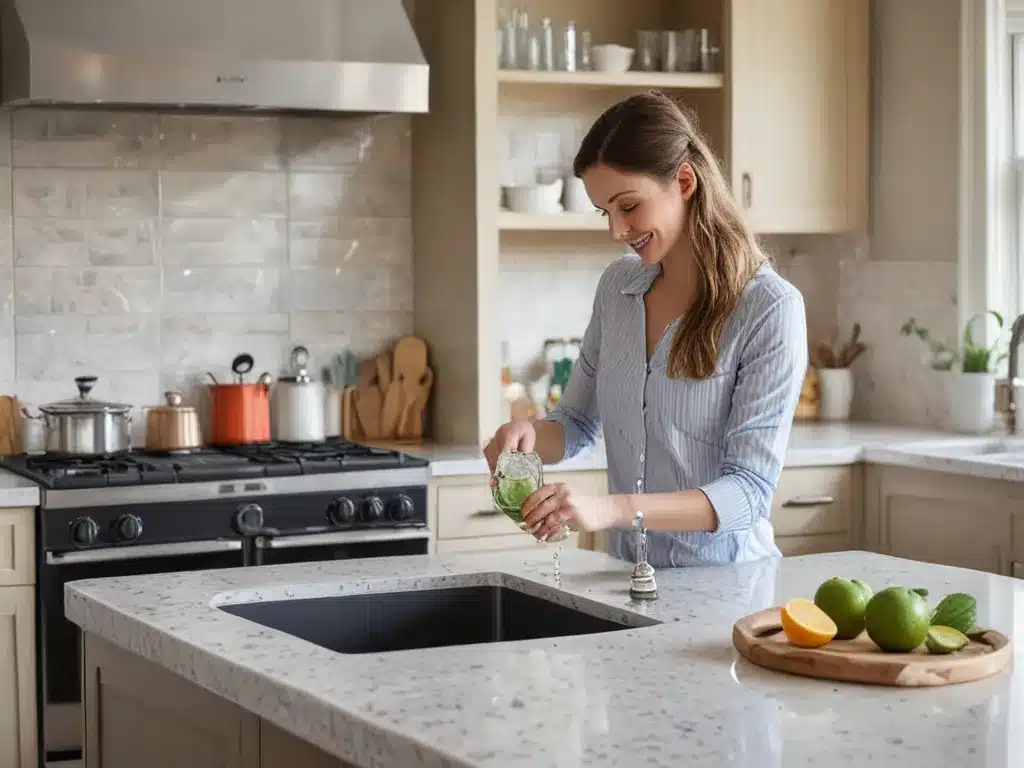Keeping your kitchen clean and germ-free is important for the health and wellbeing of you and your family. A sparkling kitchen not only looks great but helps prevent the spread of bacteria and illnesses. Here are some tips for keeping your kitchen sanitized and sparkling from top to bottom.
Regularly Disinfect High-Touch Surfaces
Kitchen counters, sinks, faucets, and appliances are common areas where germs and bacteria can grow. I make sure to regularly disinfect these high-touch surfaces at least once a day.
I use disinfectant wipes or a spray cleaner containing bleach or ammonia. Be sure to read the product labels and follow instructions for safe and effective use.
After cleaning, I allow the surfaces to air dry instead of just wiping down with a towel. This allows the disinfectant to work properly and kill more germs.
Wash Dishes and Utensils Thoroughly
Dirty dishes, cups, pots, pans, and utensils are breeding grounds for bacteria if not washed properly. I use hot, soapy water to clean each item fully after use. For extra germ-killing action, I occasionally add 1/2 cup of bleach to the wash water.
I never leave dirty dishes sitting in the sink. Used items go straight into the dishwasher or get hand washed right away. This prevents germs from multiplying quickly.
Sanitize the Sink
Kitchen sinks can become grimy with food particles, grease, and germs. To deep clean my sink, I mix together 1 cup baking soda, 1/4 cup vinegar, and 10 drops of essential oil like lemon or lavender. After scrubbing down the basin, I let the mixture sit for 15 minutes before rinsing.
The baking soda and vinegar work together to break down gunk and kill bacteria. Doing this weekly keeps my sink fresh and germ-free.
Keep Sponges Clean
Replacing kitchen sponges frequently is key. Sponges are prone to contamination and can spread bacteria around your kitchen.
I designate sponges for either dishes or countertops/tables and don’t use them interchangeably. This prevents cross-contamination.
To sanitize sponges, I soak them in a diluted bleach solution (1 tablespoon bleach per 1 cup water) for 5 minutes. Then I rinse thoroughly and allow to fully air dry before reusing. I replace my sponges every 2 weeks.
Disinfect Small Appliances
Items like your coffee maker, toaster, blender and can opener can collect hidden gunk and germs over time.
Once a week, I give these small appliances a thorough wipe down with disinfecting wipes or a 50/50 mixture of vinegar and water. For can openers, I remove the cutting wheel and wash it separately after disinfecting the handle and frame.
This routine cleaning keeps appliances free of germ buildup.
Wash Hands Frequently
Handwashing is one of the best ways to prevent the spread of germs in the kitchen. I make sure to wash hands for at least 20 seconds with soap and warm water:
- Before, during, and after food preparation
- After touching raw meat, eggs, or unwashed produce
- After eating
- After using the bathroom
- Anytime hands look dirty
Washing hands frequently when cooking and eating helps remove germs so they don’t contaminate food or kitchen surfaces.
Clean Kitchen Towels Often
Kitchen towels easily collect bacteria with daily use. To prevent germ transfer, I use separate towels for drying hands, drying dishes, and wiping counters.
I toss all the towels in the washing machine for a hot water cycle at least once a week. This kills bacteria that can accumulate in the fabric.
Take Out the Trash Regularly
Letting trash like food scraps sit in the garbage too long allows bacteria and odors to grow. I make sure to empty the kitchen trash every 1-2 days.
I use trash bags with odor controlling features to help contain smells. Taking out the trash frequently keeps germs at bay.
Deep Clean the Fridge Regularly
Your refrigerator can become a hot spot for mold, bacteria, and funky smells if not cleaned regularly. Every few months, I clear out my fridge and give it a deep clean.
- I take out all shelves and drawers and wash them in warm soapy water.
- I use a baking soda and water solution to scrub the inside surfaces.
- For the exterior, I use a disinfecting wipe to clean handles, doors, and the front surface area.
Doing a thorough deep clean keeps my fridge fresh and free of icky germs!
Practice Overall Clean Habits
Beyond major cleaning tasks, I follow general habits that help maintain a germ-free kitchen:
- I immediately wipe up any food spills or grease splatters while cooking.
- Perishable foods get stored in airtight containers to prevent contamination.
- Leftovers get put into the fridge within 2 hours of cooking.
- I take out the trash when full, not overflowing.
- Dish rags and towels only get used once between washings.
Building these sanitizing practices into my daily kitchen routine helps prevent germs from taking over!
Staying vigilant with kitchen cleaning is important for health. Following these tips will help keep your kitchen free from harmful bacteria and sparkling clean. Developing good kitchen hygiene habits takes effort but makes a big difference for your family’s wellbeing.







